513 Four-legged Friends
HORSE AND HOUND : FOUR-LEGGED FRIENDS
by David Hancock
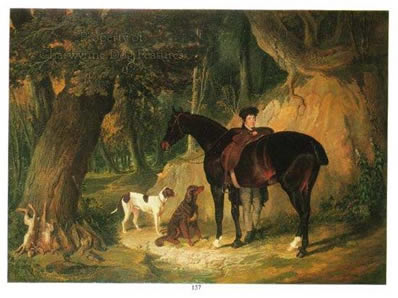

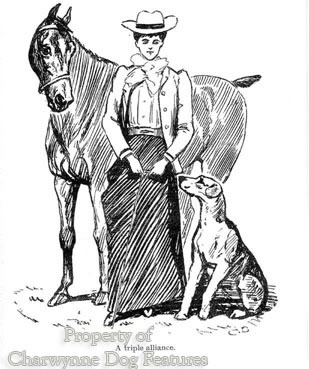
Man's abiding friendship with horse and with dog has inspired hundreds of paintings and millions of words. But dog's friendship with horse has attractedrather less coverage. The timeless trinity, man, dog, horse, has featured across the globe in just about every century of recorded history. The bilateral relationship between dog and horse has however been given less attention than that between man and each of them. Man may have brought horse and dog together but dog and horse are much more likely to share the stable! This four-legged friendship has long been a precious one, but as horse-drawn vehicles steadily gave way to motor vehicles, the stable relationship became a victim of change. More recently, with a question mark over hunting with dogs, the close relationship between horse and hound looked likely to go that way too. This threatens the future relationship between horse and dog too; man's activities are the catalyst.
Dogs and horses have experienced both the affection and use by man and the concurrent cruelty and misuse by man. In his Brutes and Beasts (Noel Douglas, 1933), John Swain summarised use and misuse. "Dogs have been used for the gratification of man in nearly all sports; run off their feet in hunting; disembowelled in bull-baiting; torn or hugged to death in the bear-rings; and bitten to death in forced dog-fights. They aided their masters in war, and died for them willingly. Not only in ancient times, but today." In 1914 the Germans had 6,000 war dogs, we had none. We caught up fast! It is estimated that around 7,000 British war dogs lost their lives by the end of the Great War.
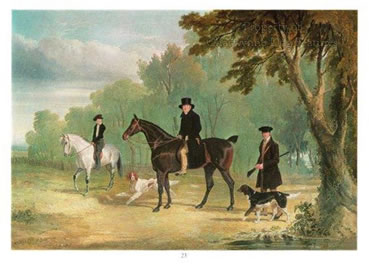
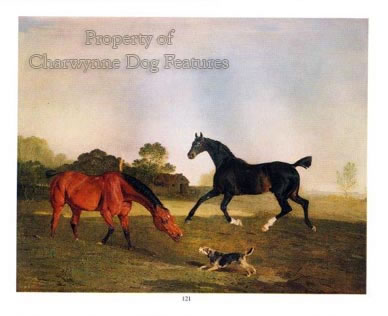
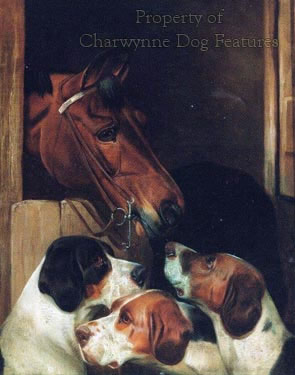
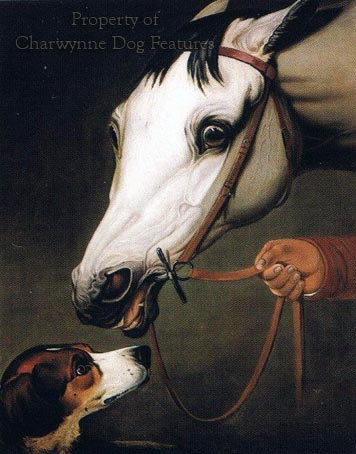
In the 'sporting' field the abuse of both dogs and horses was commonplace. The great fox-hunter Beckford, writing in 1780, stated that the common practice of flogging hounds in kennels is 'unreasonablyunjust and cruel, carried to excess, as we sometimes see, it is a disgrace to humanity.' After one four-hour run during a stag-hunt in the 19th century a report described how 'one horse dropped dead, another died before he could reach a stable and seven more within the week.' Long exploited by man, there must have been more than a little empathy and fellow-feeling when dog and horse shared the same stable. The two species share similar characteristics: honesty, loyalty, a willingness to work, a natural dignity and an uncomplaining nature. Both share a humble need for exercise, daily care, good nutrition and the occasional show of affection towards them.
Dog has suffered more than horse as a victim of man's whims over their design. But both are about to suffer a severe drop in their numbers as, paradoxically, animal welfare campaigns increasingly decide their future. Stables empty of both will no doubt go the way of barns and become transformed into human dwellings, so ending a long intimate association between horse and dog. This in turn will change the countryside, much of which has been shaped by field sports. But sadly there might be a role for the hunter and the hound in utilising their skill together to track down and humanely destroy foxes maimed by shotgun-wielding vermin-controllers, provided this does not lead them to breach the new laws. Dog, horse and fox are all man's victims. Animals classified by man as vermin causing animals developed by man to control them being destroyed? There's irony for you!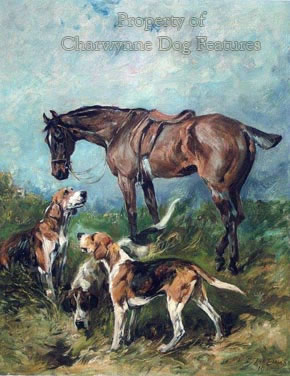
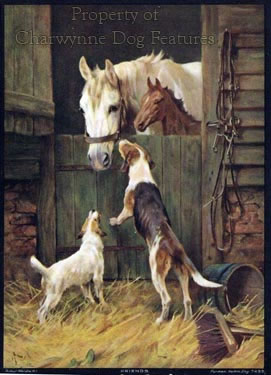
Medieval artists used the dog to symbolise fidelity and the horse to represent honesty and courage in their paintings. This high regard has survived down through the centuries. The timeless tripartite team of man, horse and dog has survived the growth of towns, the introduction of the railways, the invention of the motor-car, the decline of agriculture and wholescale changes to the human lifestyle. Some pessimists see the banning of hunting with dogs as heralding the break-up of the precious man-horse-dog relationship; certainly some rural areas will change forever and hunting dogs will be significantly affected too. The physical mutilation of the latter which accompanied King Canute's Forest Laws may one day prove to have been far less harmful in the long run, however appalling, than those enacted a thousand years later.
Dog and horse, servants of ungrateful man, shame us with their loyalty, constancy, nobility of spirit and enviable ability to overlook our failings. They should inspire us into becoming better beings. Swain once wrote, on horses, that "No animal has been used more in the service of man. If the dog has been man's companion and guardian, the horse has been man's slave." In our increasingly sophisticated and busy lifestyles, I wonder if dog isn't going the same way as horse, just as much a victim. Across the road a frightened dog, shut in an empty house all day, is whining and barking incessantly. If it were a child it would rightfully earn not condemnation but compassion. But it's only a dog.